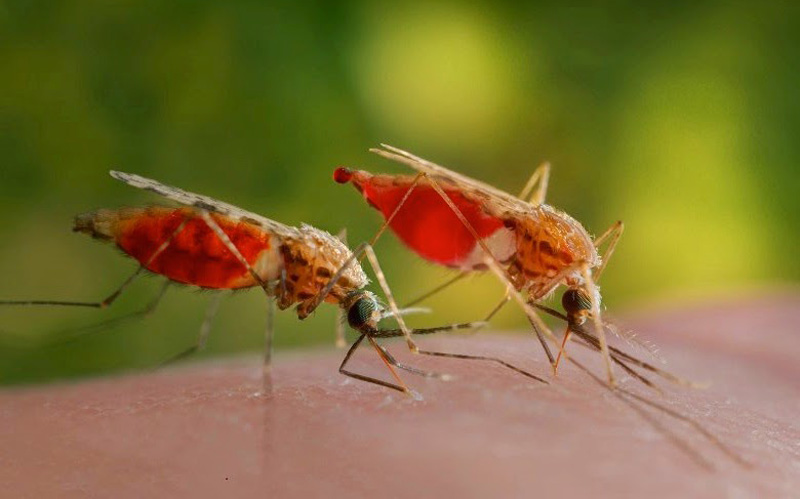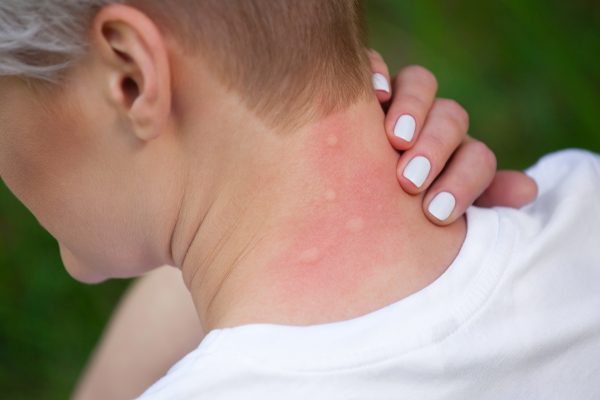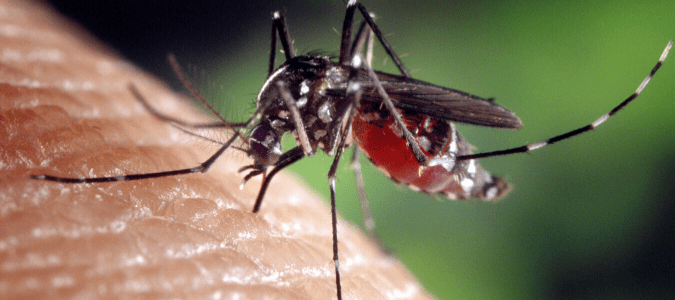A single mosquito can bite a person multiple times, with no specific limit to the number of bites. Mosquitoes will continue to bite and feed on blood until they are full, resting for a few days before laying eggs.
Mosquitoes are notorious for their irritating bites, and many people wonder how many times a single mosquito can actually bite them. Whether you’re relaxing in your backyard or camping in the great outdoors, it’s crucial to understand the behavior of these pesky insects.
Female mosquitoes, which are the ones that bite, can feed on blood multiple times without a set limit. Understanding this behavior can help you take appropriate precautions to protect yourself from potential mosquito-borne diseases and minimize discomfort from their bites. Let’s delve deeper into the fascinating world of mosquito behavior to shed light on how many times they can bite and what precautions you can take to avoid their unwelcome attention.

Credit: www.medicalnewstoday.com
The Mosquito’s Feeding Frenzy
When it comes to the pesky mosquito, one bite is often not enough. These blood-sucking insects are notorious for their persistent feeding behavior, leaving behind multiple itchy reminders of their presence. But just how many times can a mosquito bite a person?
Life Cycle Of A Mosquito
Before delving into the mosquito’s feeding habits, it’s essential to understand its life cycle. Mosquitoes go through four stages: egg, larva, pupa, and adult. The adult female mosquito is the one responsible for seeking blood meals, which are crucial for the development of her eggs.
Blood Meal: A Necessity For Reproduction
Female mosquitoes require a blood meal to produce eggs, making their quest for blood a vital part of their reproductive cycle. After finding a host, the mosquito uses her specialized mouthparts to pierce the skin and locate a blood vessel, feeding until her abdomen is full.
Multiple Bites, One Culprit
Have you ever wondered why mosquitoes seem to leave multiple bites on your skin after a single encounter? The answer lies in their feeding behavior, which often involves multiple bites to obtain the blood they need. Understanding why mosquitoes bite more than once and the factors that influence their behavior can help you better protect yourself from these pesky insects.
Why Mosquitoes Bite More Than Once
Mosquitoes bite more than once because they require multiple blood meals to nourish their eggs. A female mosquito may land on you several times, probing for a suitable blood vessel before she can obtain a full meal. Each bite delivers saliva, which contains anticoagulants that prevent blood clotting, allowing the mosquito to feed more efficiently. As a result, you may end up with multiple mosquito bites from a single mosquito.
Factors Influencing Multiple Bites
Several factors can influence why a mosquito may bite a person multiple times. These include:
- Species: Certain species of mosquitoes are more aggressive and likely to bite multiple times.
- Host Attractiveness: Mosquitoes are attracted to certain scents, heat, and carbon dioxide, which can lead to repeated bites on individuals who are more attractive to mosquitoes.
- Feeding Patterns: The feeding patterns of mosquitoes can vary, with some individuals needing to feed more frequently than others.
- Disease Transmission: Studies suggest that multiple feeding attempts occur more often when the mosquito is acquiring or transmitting disease organisms, potentially leading to more bites.
Understanding these factors can help you take proactive measures to reduce your risk of multiple mosquito bites, such as using insect repellents, wearing protective clothing, and eliminating standing water around your home to reduce mosquito breeding grounds.
Identifying Mosquito Bite Patterns
Mosquitoes can bite a person multiple times to satisfy their blood meal needs, resulting in various bite patterns. There is no fixed limit to how many times a mosquito can bite, as they will continue until full. This can lead to multiple random bites on the skin.
Single Vs Multiple Bites
Have you ever wondered why mosquitoes bite you multiple times in one sitting? Well, the answer is simple: they need more than one blood meal to reproduce. Female mosquitoes, in particular, need blood to develop their eggs. However, not all mosquitoes bite multiple times. Some mosquitoes, like the Aedes species, only bite once and move on to their next victim. So, if you notice multiple mosquito bites in one area, it’s likely that you were bitten by a mosquito that needed more than one blood meal.Recognizing The Signs Of A Mosquito Bite
Mosquito bites are usually easy to identify. They appear as raised, itchy bumps on the skin. However, not all mosquito bites look the same. The pattern of mosquito bites can vary depending on the species of mosquito and the individual’s skin sensitivity. Some people may have a single, large bump, while others may have multiple smaller bumps in a scattered pattern. Additionally, some people may not even have a visible bump, but instead experience redness and itching in the bitten area.In conclusion, identifying mosquito bite patterns can help you understand more about these pesky insects. Remember that some mosquitoes bite multiple times, while others only bite once. And, if you experience any unusual symptoms or reactions to mosquito bites, it’s important to seek medical attention.
Credit: www.outdoors.org
The Anatomy Of A Mosquito Bite
How Mosquitoes Pierce The Skin
Female mosquitoes use their specialized mouthparts to pierce the skin in search of blood vessels.
Saliva Injection And Its Effects
Mosquitoes inject saliva into the skin to prevent blood clotting, causing itching and irritation.
Myths And Realities Of Mosquito Bites
When it comes to mosquito bites, there are several common misconceptions that often lead to confusion and misinformation. Understanding the myths and realities of mosquito bites is essential for effective prevention and treatment.
Common Misconceptions
- Myth: Mosquitoes only bite once.
- Myth: Mosquitoes prefer biting certain people over others.
- Myth: Mosquitoes die after biting.
Verified Facts About Mosquito Bites
- Fact: Mosquitoes can bite a person multiple times during a feeding session.
- Fact: Mosquitoes require blood to lay eggs, leading to multiple bites.
- Fact: There is no limit to the number of times a mosquito can bite a person.
Understanding the truth behind mosquito bites can help you take necessary precautions to avoid these pesky insects and their itchy bites.
The Danger Of Mosquito Bites
Mosquitoes are persistent biters, often needing to bite multiple times to get their fill of blood. There is no set limit to how many times a mosquito can bite a person, as they will continue until they are full. This can result in multiple annoying mosquito bites after outdoor activities.
Potential Health Risks
Mosquito bites may seem like a minor inconvenience, but they can actually pose significant health risks. Mosquitoes are known carriers of several deadly diseases, including malaria, dengue fever, and Zika virus. These diseases can cause symptoms ranging from mild fever and body aches to severe illness and even death. Therefore, it is important to protect yourself from mosquito bites, especially if you live in areas where these diseases are prevalent.When To Seek Medical Attention
In most cases, mosquito bites will only cause mild irritation and discomfort. However, if you experience any unusual symptoms after being bitten, it is important to seek medical attention immediately. Symptoms to watch out for include fever, headache, joint pain, and rash. These could be signs of a mosquito-borne illness, and early detection and treatment can be crucial in preventing serious complications.To minimize your risk of mosquito bites, try to avoid being outside during peak mosquito hours (dawn and dusk), wear long-sleeved clothing and pants, and use insect repellent containing DEET or other approved ingredients. By taking these precautions, you can help protect yourself from the potential dangers of mosquito bites.Mosquito Bite Prevention Strategies
Mosquitoes are known for their itchy and irritating bites, but there are several effective prevention strategies to minimize the risk of being bitten. By implementing the right repellents, barriers, and behavioral changes, individuals can significantly reduce their chances of mosquito bites.
Effective Repellents And Barriers
When spending time outdoors, it’s essential to use effective repellents and barriers to ward off mosquitoes. Some of the most widely recommended repellents include DEET, picaridin, and oil of lemon eucalyptus. These repellents can be applied directly to the skin or clothing to deter mosquitoes from landing and biting.
Additionally, wearing long-sleeved shirts, long pants, and socks can act as a physical barrier, reducing the exposed skin surface area and making it more challenging for mosquitoes to bite.
Behavioral Changes To Reduce Bites
Implementing behavioral changes can also play a crucial role in reducing the frequency of mosquito bites. Some effective strategies include avoiding outdoor activities during dawn and dusk, as these are peak mosquito activity times. Furthermore, eliminating standing water around the home, such as in birdbaths and flowerpots, can help reduce mosquito breeding grounds.
Using window screens and mosquito nets can create a physical barrier indoors, preventing mosquitoes from entering living spaces and reducing the likelihood of bites.
After The Bite: Treatment And Relief
Mosquitoes are persistent biters, often needing to bite multiple times to get the blood they need. There is no limit to the number of times a mosquito can bite a person, leaving behind multiple annoying mosquito bites. If you spend time outdoors during the summer, you may end up with several bites from these pesky insects.
Home Remedies
After a mosquito bite, there are various home remedies that can help alleviate the discomfort and itchiness. Here are a few simple home remedies that you can try:
- Ice Pack: Applying an ice pack to the affected area can help reduce swelling and alleviate itching.
- Calamine Lotion: This soothing lotion can provide relief from itching and discomfort caused by mosquito bites.
- Aloe Vera: The natural anti-inflammatory properties of aloe vera can help soothe the skin and reduce itching.
- Essential Oils: Certain essential oils, such as lavender or tea tree oil, can be diluted and applied to the skin to reduce itching and inflammation.
Over-the-counter Solutions
If home remedies do not provide adequate relief, there are over-the-counter solutions that can help alleviate the symptoms of mosquito bites. Here are a few options to consider:
- Antihistamine Creams: Over-the-counter antihistamine creams can help reduce itching and inflammation caused by mosquito bites.
- Hydrocortisone Cream: This topical steroid cream can provide relief from itching and reduce swelling.
- Oral Antihistamines: Taking oral antihistamines can help reduce itching and discomfort from mosquito bites.
- Calamine Lotion: This soothing lotion can provide relief from itching and discomfort caused by mosquito bites.

Credit: mosquitojoe.com
Frequently Asked Questions
Can One Mosquito Bite You 20 Times?
Yes, a mosquito can bite you multiple times to get the blood it needs.
How Many Mosquito Bites Can A Human Take?
A mosquito can bite a human multiple times without a specific limit to the number of bites.
Why Did A Mosquito Bite Me Multiple Times?
Mosquitoes bite multiple times to get enough blood, often leaving you with several annoying bites.
Conclusion
Mosquitoes can bite multiple times to get the blood they need. There is no limit to how many times a mosquito can bite a person. It’s important to protect yourself from these pesky insects to avoid multiple irritating mosquito bites.
Stay informed and take precautions against mosquito bites.
Related posts:

I’m MD Tanvir, and I bring years of expertise gained from working closely with pest control companies to the forefront. My journey in the industry has inspired me to launch Bug Battler, a platform aimed at equipping people with the know-how to combat pests autonomously. Through Bug Battler, I aim to empower individuals with practical insights to tackle pest infestations effectively.

